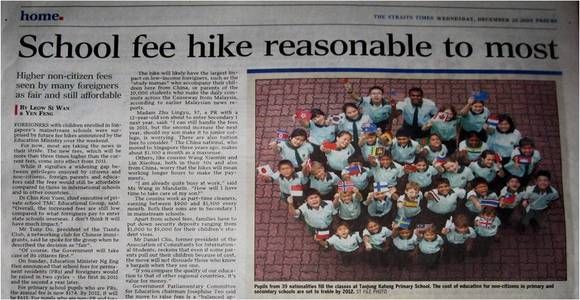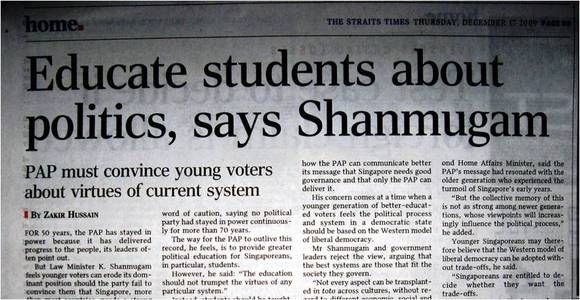Invitation:
The Online Citizen & Talk Politics’ Year In Review special forum will take place on Thursday evening, 29 December 2009, at the Post Museum. The forum will start at 7pm and end at about 10.30pm. Please do come and join us. A Man in White will be ferrying participants from Farrer Park MRT to the Post Museum. First ride starts at 6pm, then 6.30pm and 7pm.You can view the programme for the evening here. See you there!
Spiegel
Foreign talent, national identity, immigration, integration. The deluge of reportage on these issues du jour is incessant, from fears of the dilution of identity to possible citizenship tests, from ministers’ speeches to stories about foreign-born men doing national service. People care about these stuff and want to read about them.
So when the Ministry of Education announced on Monday (21 December) changes to primary 1 school registration balloting and increases in school fees for PRs and foreigners, the follow-up reports were inevitable.
On Wednesday (23 December), the Straits Times reported on page B5 of its Home section, “School fee hike reasonable to most“, with a subheading, “Higher non-citizen fees seen by many foreigners as fair and still affordable“.
When reading such a claim, you might reasonably expect some kind of number or percentage to accompany this somewhere in the story. But there are none. In support of the thesis, reporters Leow Si Wan and Yen Feng provide just three quotes – one from the chief executive of a private school, one from the president of a networking club for Chinese immigrants and one from a Malaysian parent.
They report:
Dr Chin Kon Yuen, chief executive of private school TMC Educational Group, said: ‘Overall, the increased fees are still low compared to what foreigners pay to enter state schools overseas. I don’t think it will have much impact.’
Asking someone who makes his profits off school fees whether the fee hike is reasonable is hardly the most compelling piece of journalism. Yet the reporters (or the sub-editor) placed it as the first quote in the story – that is to say, they probably thought it to be the strongest piece of evidence in support of their thesis. Which is weird, because I thought the very next quote was better in that respect, even if it did not make for very compelling prose.
Mr Tony Du, president of the Tianfu Club, a networking club for Chinese immigrants, said he spoke for the group when he described the decision as ‘fair’.
‘Of course, the Government will take care of its citizens first.’
But of course, this quote is still not exactly the money shot. Just how representative is this guy? How many parents with school-going children are there in Tianfu Club? Are they mainly affluent types or come from all sorts of social and financial backgrounds?
The reporters then use a quote from one Malaysian parent, who doesn’t seem all that bothered by the fee hike:
Malaysian parent Charlene Lee, 41, a housewife, placed her two sons in schools here. She said: “Nobody wants school fees to go up, but we are very happy with the education and opportunities my boys have received. The fee increase is still affordable for us.”
Again, we don’t know all that much about Mdm Lee. Maybe her husband earns a very respectable salary, high enough to make the fee hike a mere trifle. How representative is she of other foreign parents? We are not sure.
According to the story, besides China, the bigger sources of foreign school-going children are Malaysia, Indonesia and the Philippines, while a smaller proportion come from North America, Australiasia and Europe. So in fact the reporters had quoted one person who can scarcely represent all Chinese parents as it is (Tianfu Club is an association of Sichuanese immigrants) and one Malaysian mother to represent parents from all these regions, and expect their argument to hold up.
Later in the story, they fill us in on the views of three Chinese “study mamas”, but their opinions do not exactly come across as being supportive of the story’s main argument. All three mothers, in fact, worry either about the increased fees or having to work longer hours to afford them. The burden of supporting the thesis that “most” foreign parents find the hikes reasonable still reside with the first two unsatisfactory quotes.
To be sure, using simple anecdotal evidence like this is neither wrong nor unacceptable. Most of the time, it is impractical (although ideally desirable) to conduct a statistically significant survey for the purpose of writing a story. As such, journalists will rely on quoting a handful of members of the public or interested persons to illustrate certain points of view to provide depth to their stories. And for the most part it is fine, as long as you write with the requisite reticence to acknowledge that your findings are nowhere near conclusive.
But for this particular piece, I have my doubts. It is making quite a specific and loaded claim that appears a little counterintuitive, on an issue in which the government has a clear stake. And considering the number of people whose opinion they are trying to represent – parents of about 60,000 non-citizen school-going children, according to their story – I suspect the reporters may have overplayed their hand.
Armed with such anecdotal evidence, it is still possible to write a factually sound story. The headline might be something like, “School fee hike reasonable to some” – a display of reticence that is consummate to the quality of evidence available. But that wouldn’t make it much of a news story, would it?
For some contrast, I present Channel News Asia’s story on the same issue. Its headline on TodayOnline says it all – “Foreigners split over move to raise school fees” (interestingly, CNA’s own headline is “School fee hike may prompt more foreigners to take up citizenship“).
I quote the two relevant paragraphs here:
While some foreigners felt that the hike was reasonable given the schools’ increasing expenditure, including teachers’ salaries, others felt the steep increase was “unfair”.
Said a foreigner: “Of course, it’s good news for Singaporeans but they should put a cap to the fee increment. Times are bad and everyone is under a lot of pressure.
Concededly, the CNA story is not that great either. While it cited several “foreigners”, no indication is given as to how many the reporters Maggie Chong and Dylan Loh spoke to – the reader has nothing to go by in order to judge the validity of CNA’s claims. Furthermore, the foreigners are all quoted anonymously. Considering that the Straits Times managed to get three “study mamas” to go on the record, this lack of attributed material leaves something to be desired.
But sloppy reporting aside, there is something to be said for CNA in this case. It sat on the fence, because it knew it didn’t have enough to go by in making a case in either direction. The Straits Times, however, picked a side even when it was not able to produce the evidence to back its story up.
Moving swiftly on, I bring your attention to the Straits Times‘ political reporting. It seems that Zakir Hussain continues to flatter to deceive in his role as political correspondent. In the 19 December issue, the Oxford-educated and Columbia University Graduate School of Journalism-trained reporter ditched his years of training and became no more than a parrot.
In summary, Law minister K Shanmugam had penned an editorial in Petir, the People Action Party’s bi-monthly magazine, and Hussain promptly regurgitated it. There was so little journalistic input from Hussain in that piece that you actually had to go looking for it. I’ll save you the trouble and show you where it is – the twelfth paragraph, where he wrote:
It is a position he has argued vigorously in favour of in the past three months: first to a group of international lawyers meeting here in October, then the Harvard alumni in Singapore last week, and now, PAP members.
There it is. Just the one out of the 18 paragraphs in the story. The only one in which its content cannot be derived directly from Shanmugam’s Petir editorial.
Every political party puts out its own publications laced with grandstanding statements and editorials. How this one in particular is more newsworthy than the rest, only Hussain knows. He would have been onto something if he could get people from other parties, or even the PAP itself, to challenge these statements. He might have more to go on if he could get political scientists and observers to critique Shanmugam’s claims. There would be more legs on the story if he got input from members of the public – the students and the youth in question. Perhaps the story would work better as commentary than straight news (because it isn’t, really).
In fact, why did he even bother to write it up as a story? They could have saved Hussain’s efforts and just printed Shanmugam’s Petir piece verbatim in the Review and Forum page, like they did with an excerpt of Shanmugam’s speech on the government’s foreign talent policy to the Harvard Club of Singapore.
Maybe they wished to pass this off as a piece of journalism – a product that has ostensibly been filtered through a journalistic process – and therefore attach that bit more credibility to what otherwise would have been dismissed outright as party propaganda.
P.S.: FAO Mr Alan John, deputy editor of The Straits Times. The aforementioned is why people think your newspaper is a government mouthpiece, and quite justifiably so.
—–




